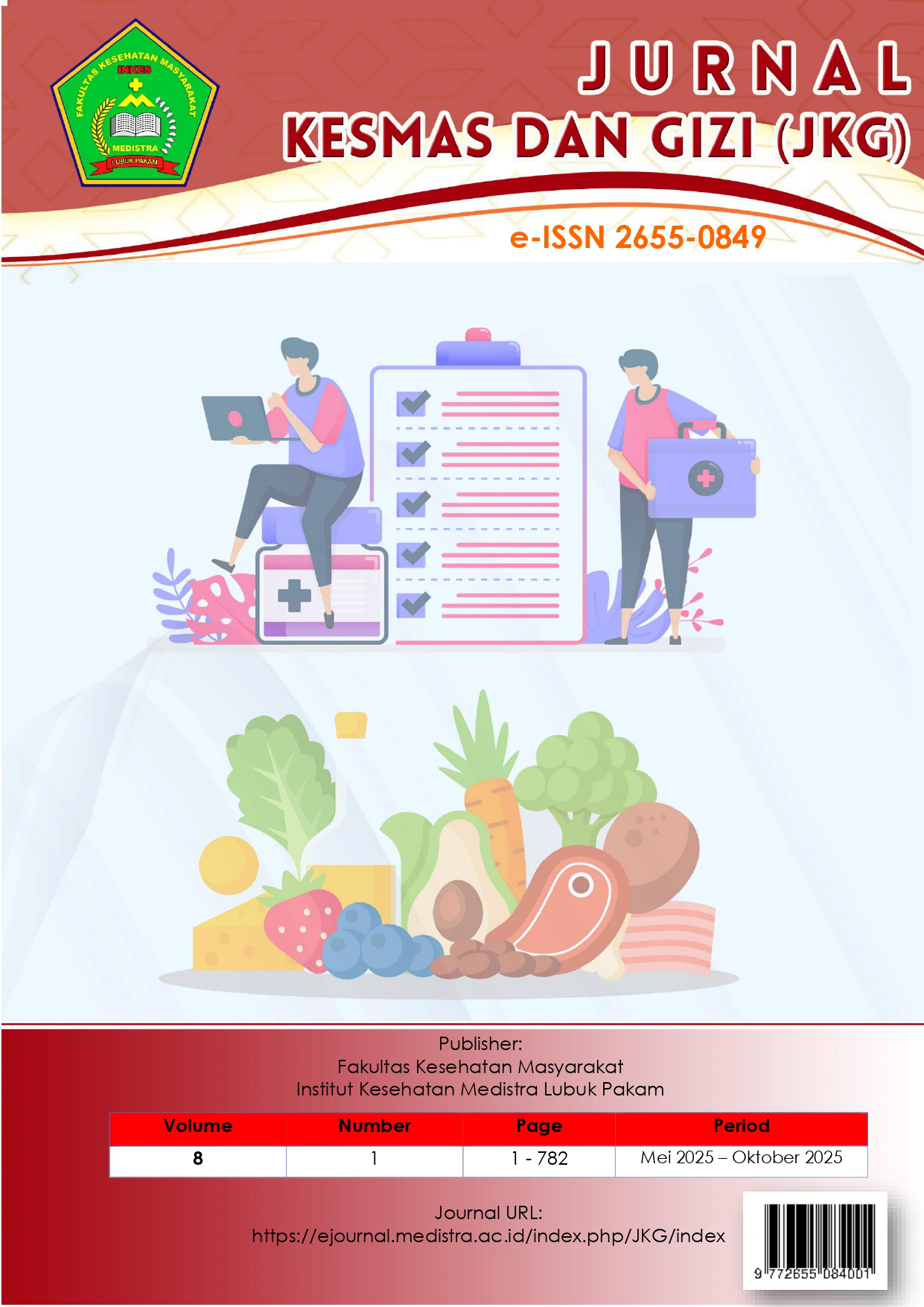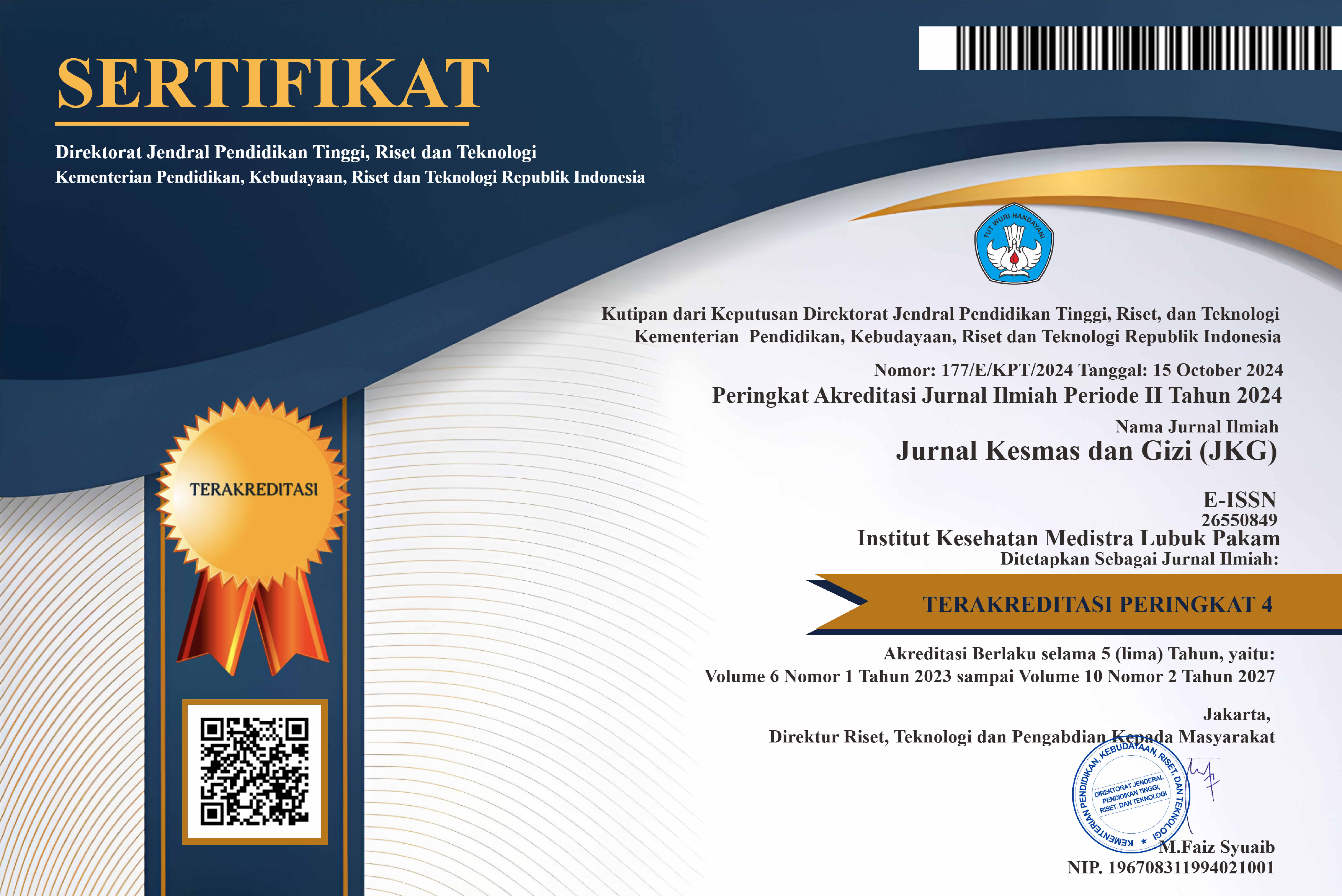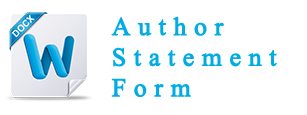Relationship BetweenoMothers' Knowledge1of Balanced Nutrition and the NutritionalKStatus ofKToddlers at the Sialang Bangun Purba Community Health Center
DOI:
https://doi.org/10.35451/waqs1v11Keywords:
Balanced Nutrition; Nutritional Status; Toddlers; Cross-sectional; Chi-SquareAbstract
The nutritional status of toddlers reflects their future health. Mothers' understanding of balanced nutrition plays a role in determining and providing appropriate food intake for toddlers. The purpose of this study was to determine the relationship between mothers' knowledge of balanced nutrition and the nutritional status of toddlers in the working area of the Sialang Bangun Purba Community Health Center. This study used a cross-sectional design with a quantitative approach. The sample consisted of 60 mothers with toddlers aged 0-5 years, selected using purposive sampling. Mothers' knowledge was obtained through questionnaires, while the nutritional status of toddlers was measured using anthropometry with weight-for-age as an indicator. Data analysis was performed using the Chi-Square test. The results showed that most mothers had a good level of knowledge (53.3%), and the majority of toddlers also had good nutritional status (53.3%). Based on the statistical test results, a p-value of 0.000 (p<0.05) was obtained, indicating a significant relationship between mothers' knowledge and toddlers' nutritional status. Thus, if mothers have a good understanding of balanced nutrition, their children's nutritional status will also be better. Therefore, nutrition education for mothers is essential to encourage the implementation of healthy eating patterns and prevent nutritional problems in toddlers.
Downloads
References
[1] H. P. Oktarini, Riski Dwi, Entianopa, “Analisis Faktor yang Mempengaruhi Status Gizi pada Balitadi Kabupaten Lampung Utara,” J. Profesi Kesehat. Masy., vol. 2, no. 1, pp. 31–54, 2021.
[2] S. T. ‘Aliah Istiqomah, Kristin Masmur S, Ribby Aurellia Amali, “Peran Gizi Terhadap Pertumbuhan Dan Perkembangan Balita,” Antigen J. Kesehat. Masy. dan Ilmu Gizi, vol. 2, no. 2, pp. 39–51, 2024, doi: 10.57213/antigen.v2i2.257.
[3] “Kementrian Kesehatan Republik Indonesia (2020) Rencana Aksi Kegiatan Direktorat Gizi Masyarakat Tahun 2020-2025. Jakarta.: Kementrian Kesehatan Republik Indonesia.”.
[4] Kemenkes RI, “Hasil Survei Status Gizi Indonesia (SSGI) 2022,” Kemenkes, pp. 1–150, 2022.
[5] A. F. Butarbutar and L. Mutia, “Hubungan Pengetahuan dan Sikap Ibu Tentang Gizi Dengan Status Gizi Balita Di Puskesmas Bandar Khalipah Kec. Percut Sei Tuan Kab. Deli Serdang Tahun 2019,” J. Kesehat. Masy. Gizi, vol. 2, no. 1, pp. 79–84, 2019, doi: 10.35451/jkg.v2i1.248.
[6] R. F. Wulandari, A. Rizqi, and M. I. P. Negara, “Hubungan Pengetahuan Gizi Seimbang dengan Status Gizi Sebagai Indikator Keberhasilan Program Makan Bergizi Gratis Pada Siswa,” Abdimas Awang Long, vol. 8, no. 2, pp. 283–290, 2025, doi: 10.56301/awal.v8i2.1683.
[7] Mardiana R & Kusumawati E, “Analisis Faktor Yang Mempengaruhi Pengetahuan Ibu Tentang Gizi Seimbang Pada Balita: Studi Komparatif Berdasarkan Status Pekerjaan,” J. Kebidanan dan Kesehat., vol. 14, no. 2, pp. 127–138, 2020.
[8] G. Ayuningtyas, U. Hasanah, and T. Yuliawati, “the Relationship of Mother ’ S Knowledge Level With the Nutritional Status of Toddler,” J. Nurs. Res., vol. 1, no. 1, pp. 15–23, 2021.
[9] I. D. Oktaviasari, A. Afif, R. F. Nurkhalim, and N. Urbaningrum, “Pengetahuan Ibu tentang Gizi Seimbang dan Pola Konsumsi Anak Pra-Sekolah pada Masa Pandemi Covid-19,” J. Ris. Pengemb. dan Pelayanan Kesehat., vol. 2, no. 1, pp. 1–7, 2023.
[10] A. F. L. D’Cruz, K. L. Downing, E. Sciberras, and K. D. Hesketh, “Are physical activity and sleep associated with emotional self-regulation in toddlers? a cross-sectional study,” BMC Public Health, vol. 24, no. 1, pp. 1–8, 2024, doi: 10.1186/s12889-023-17588-2.
[11] S. Widad, “Hubungan Tingkat Pengetahuan Ibu dengan Status Gizi Balita Usia 6-59 Bulan di Posyandu Desa Pandean Probolinggi,” Heal. Res. J., vol. 2, no. 1, pp. 72–80, 2024.
[12] R. Panjaitan, S. Mastiur, W. Maria Ginting, D. Novita, J. Manurung, and M. Manalu, “PENGETAHUAN DAN PERILAKU GIZI SEIMBANG TERHADAP KEJADIAN HIPERTENSI DI DESA SUGIHARJO KECAMATAN BATANG KUIS Knowledge, Nutrition Behavior Conduct Toward Incidence of Hypertension In Sugiharjo Village Batang Kuis Sub-District,” vol. 5, no. 2, pp. 2655–0849, 2022.
[13] F. Lamia, M. I. Punuh, and N. H. Kapantow, “Hubungan antara Pengetahuan Gizi Ibu dengan Status Gizi anak usia 24-59 bulan di Desa Kima Bajo Kecamatan Wori Minahasa Utara,” Kesehat. Masy., vol. 8, no. 6, pp. 544–551, 2019.
[14] M. s. dr. Nunung Cipta Dainy, S.P., “Pentingnya Memahami Asupan Gizi Pada Tubuh.”
[15] “Sitanggang, T. W., & Werdana, Y. I. (2021). Hubungan Tingkat Pendidikan Dan Pengetahuan Ibu Tentang Kebutuhan Gizi Terhadap Status Gizi Balita. Jurnal Kesehatan Stikes Imc Bintaro, 4(1), 41–50.”.
Downloads
Published
Issue
Section
License
Copyright (c) 2025 Salmi Angraini, Lindra Cahaya Putri Waruwu, Edarni Zebua, Dian Novita, Wira Maria Ginting

This work is licensed under a Creative Commons Attribution 4.0 International License.
Copyright in each article is the property of the Author.



























